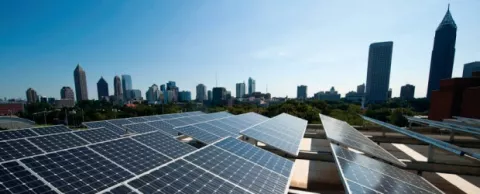
A growing number of cities eager to ensure a safe and sustainable place for its citizens to live and work are increasingly turning to the technologies and concepts of smart cities to ensure a healthy economy, and environmentally responsible and efficient operations. They also want to deliver a broad range of expanded services: from traffic management to health care, public safety and more.
By now, it's taken for granted that those cities must collaborate with their utilities to meet those goals. And in turn, their influence on our energy future is growing. In a guest column in the Environmental Leader, Eric Woods, research director for business consulting firm Navigant explains findings from a new report, Smart Energy for Smart Cities, that describes how extensively smart cities are shaping the energy industry's smart grid transformation. Briefly, it has a lot to do with new city energy policies and strategies.
Why smart cities have so much clout
"Cities have played a key role in the development of many of the technologies and new business models associated with the transformation of the energy sector. Some of the most important advanced smart grid demonstrations have involved close partnerships between municipalities and local utilities. Cities are also driving forward smart metering and energy efficiency programs," Woods explained.
Also, cities are taking advantage of the energy industry transition to what it refers to as the Energy Cloud, a move away from the old centralized power generation model to one that allows more choices for how energy is generated (renewable energy for example), delivered and used. Cities are working with utilities to come up with new energy strategies that are distinctly urban.
One good example emerged from DistribuTECH this week when Council Associate Partner Siemens unveiled its new Microgrid Software as a Service. Specifically designed for small power operations like those you’d find in cities, university campuses, commercial and industrial operations and utilities that want to provide service for many microgrid end users. Siemens also announced a stronger portfolio for utility infrastructure operations.
Woods noted five important areas where city influence on the energy sector is most evident:
- Speeding up the move to renewable energy. Cities generally want their utilities to move from fossil fuels to renewables to help them meet emissions reduction goals.
- Driving smart grid technology adoption. Those technologies enable cities to efficiently integrate, monitor and manage those renewables, and they make it easier for cities to make other changes to their energy systems.
- Accelerating energy efficiency. Strong energy efficiency programs allow cities to use less energy, and tools such as retrofitting and rebate programs can help them achieve it.
- Increasing resilience. Many cities learned the hard way during superstorms such as Hurricane Sandy how important a strong, resilient energy infrastructure is. A serious outage doesn't simply mean the lights go off. It affects services from water and health to communications and transportation.
- Growing participation in energy management and energy markets. Cities are taking a much more hands-on approach to how managing their energy systems and also are becoming more active in local energy markets, whether in cooperation with their utilities or in competition with them.
So, cities are taking on a larger role in energy management, efficiency and other related areas and that role is expected to grow. As Woods put it "In the process, cities will become clusters of smart energy communities that can exploit the benefits of the new energy systems."
Related articles…
What's the secret to healthy, resilient electrical grids? If you don't know, find out
Smart grid delivers more than reliable power (think investment capital and jobs)
Now your utility can rent a smart grid



